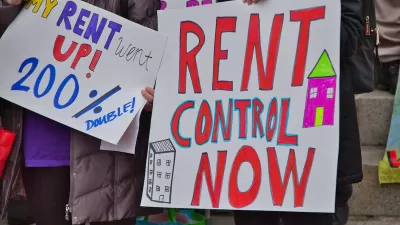The city is pulling back on some provisions in the rent stabilization ordinance passed by voters last fall.

St. Paul, Minnesota’s city council will amend the city’s rent stabilization ordinance after critics complained about the new rules, which would have been the strictest in the nation. According to an article by Bill Lindeke in the Minneapolis Post, “the proposed changes are not bad news for renters because the on-the-ground reality is more complicated than the campaign rhetoric.”
In Lindeke’s view, “the amendments keep the good parts of the ballot ordinance (even adding some new benefits, like just cause eviction protections) while shedding the provisions that have already caused disinvestment in St. Paul housing.”
Lindeke points out that, for example, the 3 percent cap on rent increases included in the original ordinance was subject to a series of exceptions that would let landlords raise rent by as much as 8 percent per year. “The legalistic bait-and-switch between the symbolic and actual rent caps has the added effect of being opaque and confusing, likely to alienate anyone who’s not into computing interest on an amortized investment, using the average rate from Freddie Mac over the last thirty years plus two percent.”
In spite of this, the ordinance has had a chilling effect on new housing construction, with new construction dropping by anywhere from 35 to 75 percent since its implementation. In Lindeke’s opinion, “The obvious solution has always been to pass an exemption for new construction, and the City Council proposal sets a rolling exemption window for twenty years, meaning that apartments in a building built today would enter the city’s rent control system in 2042.”
Lindeke argues that rent control is not an effective tool “in a country predicated on private market housing.” However, “ thanks to the City Council amendments, the end result of this long process is that the city will have a strong rent stabilization policy that focuses on renter stability, a more achievable goal.”
FULL STORY: St. Paul’s rent stabilization amendments will help renters

Maui's Vacation Rental Debate Turns Ugly
Verbal attacks, misinformation campaigns and fistfights plague a high-stakes debate to convert thousands of vacation rentals into long-term housing.

Planetizen Federal Action Tracker
A weekly monitor of how Trump’s orders and actions are impacting planners and planning in America.

Chicago’s Ghost Rails
Just beneath the surface of the modern city lie the remnants of its expansive early 20th-century streetcar system.

Bend, Oregon Zoning Reforms Prioritize Small-Scale Housing
The city altered its zoning code to allow multi-family housing and eliminated parking mandates citywide.

Amtrak Cutting Jobs, Funding to High-Speed Rail
The agency plans to cut 10 percent of its workforce and has confirmed it will not fund new high-speed rail projects.

LA Denies Basic Services to Unhoused Residents
The city has repeatedly failed to respond to requests for trash pickup at encampment sites, and eliminated a program that provided mobile showers and toilets.
Urban Design for Planners 1: Software Tools
This six-course series explores essential urban design concepts using open source software and equips planners with the tools they need to participate fully in the urban design process.
Planning for Universal Design
Learn the tools for implementing Universal Design in planning regulations.
planning NEXT
Appalachian Highlands Housing Partners
Mpact (founded as Rail~Volution)
City of Camden Redevelopment Agency
City of Astoria
City of Portland
City of Laramie





























